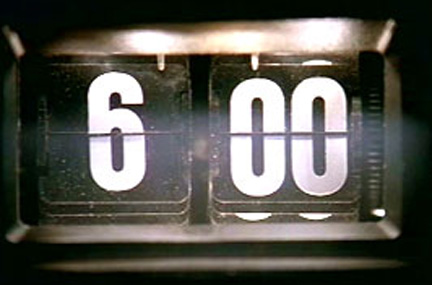Warning.
I’m starting the week off with a rant of sort.
When I first got started with Twitter about 6 months ago, one of my earliest Tweets was about Sallie Mae.
I really don’t remember what that Tweet was about, but I did get an eye opener in the process of trying to find just the right tone for my stock related Tweet.
Not really being familiar with the world of “hashtags” and not knowing that a stock was represented by the “$” sign, I searched for Sallie Mae Tweets.
I wanted to know how to do this Tweet thing properly, after all. I wanted to do my research, make certain that I had appropriate references and citations and be cogent and poignant within the contxt of 140 spaces.
Oh, and funny, too.
I certainly didn’t want the Tweet to be frivolous or to waste anyone’s precious time.
I was stunned to see the venom out there about one of my favorite stocks. There was nothing funny about Sallie Me in the eyes of people Tweeting about it.
 To me, Sallie Mae was beautiful. I wasn’t really prepared to learn just how ugly it was in the eyes of some many others.
To me, Sallie Mae was beautiful. I wasn’t really prepared to learn just how ugly it was in the eyes of some many others.
I had owned shares, on and off, for about 3 years, always selling call options in the process.
During that time, I’d gone along for the ride from about $6 to $16. It wasn’t straight line, but that’s how I like things. So much better to make money raking in call options that way.
But people hated Sallie Mae. Not the stock, but the company.
When you consider that the word “Shylock” has been around for 400 years, as a sign of society’s contempt for those who seek to earn by lending, it’s not too surprising to learn of the contempt modern day debtors have for those that provide capital at a cost.
They hated the loan process, they hated the bureacracy and they hated the fact that they had to pay back the money they had borrowed for their education. There may have been other reasons, as well, but I gave up reading through the Tweets, I’d gotten the message.
The message was that there really was much interest on Twitter for reading about the merits of the stock, itself.
As the Occupy Wall Street phenomenon finally drew media attention after about a month of toiling in obscurity, there was still lots of uncertainty over the goals of the demonstrators.
Not surprisingly, like the Tea Party protestors and those that participate in World Bankapalooza, there are many people with their own agenda just looking for someone to break wind for them.
You know what I mean. Not that kind of breaking wind.
Among the many posters and placards out there the ones that caught my attention and that of the media were those complaining about their financial plight, post-college.
The refrain was that among the 99% were those with large school loans and either unemployed or under-employed.
And sure enough, the plight of that portion of the Occupy Wall Street protestors made it to TIME Magazine. Not quite important enough for a cover, but still, 5 pages in an ever shrinking magazine is a considerable allocation of space in the post Jobs and Khaddafi worlds.
Sallie Mae, the one time sibling of all deceased things Mae and Mac is in the business of educational loans. One time they were the executors of all of those federally subsidized loans, but when they dropped the “quasi” in the relationship with the government, the moved to the world of private and uncapped student educational loans.
So the bottom line is that people owe Sallie Mae money.
They just don’t like Sallie Mae, at least not the part of Sallie Mae that requires loan repayment.
Sound familiar? If not you need to see some of Marek Fuchs’ work. He does an excellent video series on TheStreet.com, “They Just Don’t Get….”, fill in the blank with eBay, Microsoft, Netflix or whatever big hitter is in the news, He has the ability to see beyond the moment and emotion. My only complaint is that the bookcase appearing behind him in those videos lacks a certain balance that only a copy of Option to Profit could remedy.
If I ever get a bookcase, the first thing going on it would be “A Cold Blooded Business.” Probably the only thing, because I don’t read very much.
Homage? Maybe so, but perhaps I should apologize for using the same concept. I least I spared you the video presentation of my face. Also, I could care less about the business prospect component of Sallie Mae.
It’s hard to believe that at one time I used to march and make my voice heard, but I have a hard time feeling much for that portion of the Occupy Wall Street crowd that is complaining about high professor salaries and high college indebtedness.
Granted, I was lucky to have gone to college and professional school at a time when scholarships were plentiful and loan money could be cheaply obtained.
Eight years of private college and professional school left me with a bill of only $24,000 and 10 years with which to retire the debt. For purposes of this blog I didn’t bother to do a “Future Value” calculation, so let’s just leave it at $24,000.
Even more fortunately, my kids will have no school related debt and they will probably never do a “Future Value” calculation in their lives.
So why do I have a hard time understanding the complaints since I understand the hurdles?
No one delves into the necessary questions behind the protestor posters. Exactly how many years did it take for you to get your degree in a major that has no job prospects, after having changed your major 2 or 3 times?
Really, you turned down an opportunity to go to your local community college while you were still in the process of discovering your true self, thereby turning down the opportunity to get a guarantee transfer of all credits to one of your state university’s 4 year programs?
And save lots of money in the process?
Taking 6 years or more to get an undergraduate degree was funny in Van Wilder, when it wasn’t too common. But it’s all too common now. Tim Matheson, who was a rebel in Animal House, was the establishment in Van Wilder and he laid the law down.
No more free ride.
Once you decided to eat up that low interest rate limit on loans by going more than 4 years you’ve entered into the world of those uncapped interest rate loans.
Hello Sallie Mae
Partied too much to pick up a few extra dollars with a part time job? What, your parents wouldn’t contribute to your educational bills? That seems fairly common, at least you might believe so if you’d read the TIME article.
Why take it out on the poor people at Sallie Mae? They didn’t hold a gun to your head forcing you to change majors, or take that year overseas drinking Dutch beer. That would have been Gunnie Mae.
They didn’t harden your parents’ hearts and wallets. That would have been Uncompassionate Mac.
For that matter, they certainly didn’t shame you into going to college in the first place.
I know that’s been an area of recent controversy. James Altucher has commented and written about how a college education may be quite worthless for some people, as have some successful entrepreneurs.(See Altucher’s “Don’t Send your Kids to College“)
The wisdom there is that if you have the money to pay for college, use it instead to launch yourself into a career, business venture or otherwise.
Of course, if you don’t have that kind of money you can either consign yourself to the predictable path of lowered expectations or indebtedness, for a degree of your own choosing, based on the rants above.
Of course, tuitions are much too high and woefully little is done to prepare students to set their sights on a goal of graduating within the life span of a Great Dane. Colleges don’t offer guidance and neither do parents.
But why blame Sallie Mae?
Oh, I know, because the other option is taking personal responsibility.
In fact, Sallie Mae, in all likelihood, helped many, many people attend college, who perhaps would have been unable to do so in past and present generations and who ultimately went on to be contributing members of society.
Maybe even in that hated 1%.
Probably quite a few of the protestors have parents in that category, or who at least benefited from Sallie Mae in the past.
Equally likely is that for those having parents who were unable to attend college, thereby likely to earn less over their productive work lifetimes, there would be less ability to pay for their own children’s college education.
I now that all of the above suppositions are unfair. Obviously there will always be significant exceptions to every stereotype and there will be many deserving and well meaning people tagged by that broad brush.
So too should protestors come to understand the facts that indicate that the hated 1% is made of very few of the hated people that they are targeting. Wall Street, banking and hedge fundies are just a speck within that one percent.
Doctors, lawyers and other professionals who worked through the system, paid their dues and paid their bills, while having sights set on a higher goals than just looking to palm off responsibility for bad decisions.
And then there are the lucky ones making truly obscene amounts of money and skewing just about every statistic you can imagine. For every Warren Buffett, there are 100 George Clooneys and Tom Bradys.
As it turns out in a time of economic distress and joblessness, the marketplace has less need for a 6 year educated college graduate with an emphasis on “Classics” and “European Art.”
Now, Sallie Mae will still be hated, regardless, because you always hate “The Man.”
But the crosshairs are pointed in the wrong direction. Lenders have no incentive to see their clients default. They like money too much to accept unacceptable risk.
It’s unlikely that Sallie Mae or the banks holding those student loans have any interest in taking a Greek style haircut, even if a portion is federally guaranteed. Sallie Mae may be “The Man”, but it is decidedly in the long hair camp.
Instead, aim those crosshairs a bit to the right, to draw from the Sarah Palin imagery.
Those who have conveniently forgotten the agreement some 10 years ago to have the Bush era tax cuts sunset. Take some aim in that direction.
Those who cling to the theory of “trickle down” economic theory, which has now had nearly 30 years of laboratory experience to prove that it is not a strategy for all times and situations.
Yeah, aim there, too.
While I agree with the notion that a small segment of our society has helped to compound the economic meltdown, it’s just too easy to place all blame at their feet.
Sure, march around, but do something constructive.
Vote. Call your Congressman and demand an end to dogma and stalemate.
If they don’t move on those demands, then point those crosshairs at their feet and make them dance to something other than loud-mouthed pledge pushers.
But don’t take the crosshairs thing literally, please. That’s just for those on the right.

 You’d be more inclined to believe that had Newton discovered the parachute before the Law of Gravity, things would be very different today for all of us.
You’d be more inclined to believe that had Newton discovered the parachute before the Law of Gravity, things would be very different today for all of us. Haircuts do that sort of thing to people.You know how irrational people can be when they get a haircut that doesn’t suit them or that doesn’t satisfy their preconceived notions.
Haircuts do that sort of thing to people.You know how irrational people can be when they get a haircut that doesn’t suit them or that doesn’t satisfy their preconceived notions. One of the problems with getting older is that you don’t dream quite as frequently , vividly or with as much imagination.
One of the problems with getting older is that you don’t dream quite as frequently , vividly or with as much imagination. Why would unknowns just barge in and take you away? Even worse, what if they put an evil doppleganger in your place, sent to undo all of what you had done?
Why would unknowns just barge in and take you away? Even worse, what if they put an evil doppleganger in your place, sent to undo all of what you had done?


 In recent years, “fundamentalism” has gotten a bad rap.
In recent years, “fundamentalism” has gotten a bad rap.
 I don’t know if Ron Paul has considered that shortcoming. It’s no surprise that you don’t find Godfather’s Pizza offering a gold topping. It may have as much to do with the fact that would be a price buster for the 9-9-9 special, as much as it has to do with its inedible state.
I don’t know if Ron Paul has considered that shortcoming. It’s no surprise that you don’t find Godfather’s Pizza offering a gold topping. It may have as much to do with the fact that would be a price buster for the 9-9-9 special, as much as it has to do with its inedible state. I had a friend in college who always thought that he was the desire of every woman’s dreams. He used to proudly show me the condom that he kept in his wallet, as he always needed to carry “protection.”
I had a friend in college who always thought that he was the desire of every woman’s dreams. He used to proudly show me the condom that he kept in his wallet, as he always needed to carry “protection.” Groundhog Day, the Bill Murray movie, is reportedly the most played movie on television and basic cable. I know that I’ve done my fair share of viewing that movie over the years, first starting with it’s original theatrical release and then seeing it ad nauseum during that bizarre commuting phase of my life, spent in many a hotel room.
Groundhog Day, the Bill Murray movie, is reportedly the most played movie on television and basic cable. I know that I’ve done my fair share of viewing that movie over the years, first starting with it’s original theatrical release and then seeing it ad nauseum during that bizarre commuting phase of my life, spent in many a hotel room.